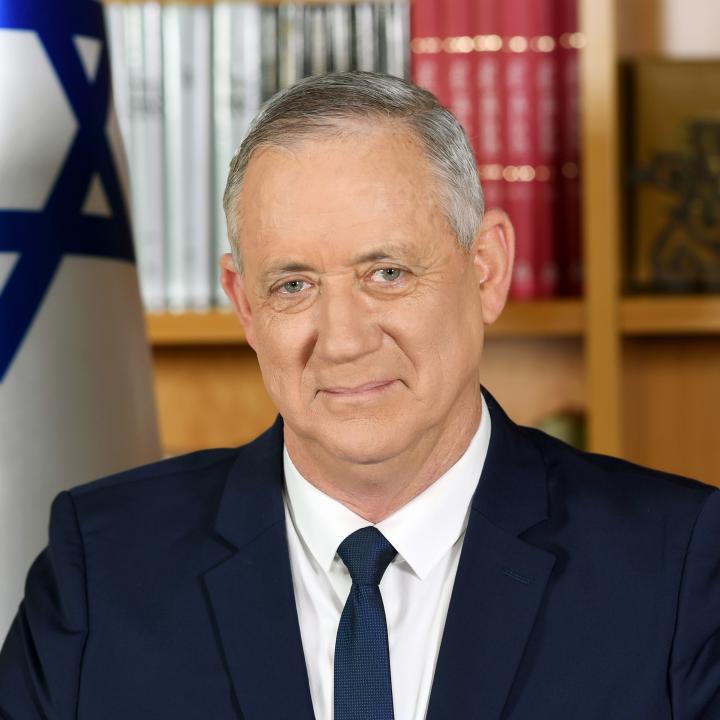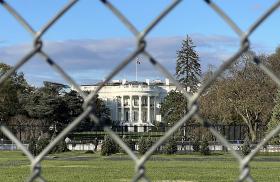
- Policy Analysis
- PolicyWatch 3748
Israel's Challenges at Home and Abroad: A View from the Opposition

Opposition leader and former defense minister Benny Gantz discusses Israel’s domestic political challenges, the triggers for action against Iran’s nuclear program, the prospects of normalization with Saudi Arabia, and more.
On June 6, The Washington Institute held a virtual Policy Forum with Benny Gantz, moderated by Robert Satloff and David Makovsky. Gantz, the chairman of Israel’s National Unity party, served as minister of defense from 2020 to 2022 and previously as chief of staff for the Israel Defense Forces.
NOTE: The following is a rapporteur’s summary of Gantz’s remarks, not a transcript. None of the text below should be quoted as verbatim remarks; consult the event video above for the general’s direct comments.
Benny Gantz
Israel is currently dealing with five main challenges. First is the fallout from the Ukraine war, which has a global economic impact and has affected NATO operations. It also holds implications for Russia’s strategic relationship with Iran and, to some degree, China. The suffering of the people in Ukraine should not be ignored either. Second is the Iranian issue—by exporting drones to Russia, Tehran has found a viable path around international sanctions and gained operational and technological experience. Third is preserving Middle East stability, which includes countering Iran’s ability to undermine regional order. The results of recent talks between the United States and Saudi Arabia are unclear, but expanding the Abraham Accords remains a possibility. Fourth is the internal situation in Israel. The nation must be preserved as a solid democracy with strong institutions. Fifth is the need to make progress on the Palestinian issue where possible.
As Israel marks its seventy-fifth anniversary, it stands as the strongest country in the Middle East, with the strongest economy besides Saudi Arabia’s, the strongest military force, and a vibrant society. Despite these achievements, however, the security issues Israel faces will not disappear, so it must remain the strongest regional power no matter what happens in the future.
The Iranian issue should be emphasized as a global challenge first and foremost, and then as a regional challenge, not as a threat to Israel alone. Iran’s actions affect the entire Middle East, as well as South America, Africa, and other regions.
In countering the Iranian nuclear program, Israel will need to take action if and when it proves necessary, whether or not the United States is involved. Washington understands this. An immediate operation against the program is not necessary, but the time for action is closer than before. The window until Iran reaches a critical level of nuclear enrichment is closing—it cannot be allowed to advance enrichment any further. Actions escalating toward regional war are not Israel’s first option but should be considered as a credible option. All countries have an interest in coordinating on this issue, and if there is a solution without war, that would be preferable.
If the Iranians reach 90 percent enrichment, that would certainly be an issue. Once they cross that threshold, they could distribute nuclear materials and technology to covert locations, making it difficult for Israel and allies to interdict the program. Israel understands—and other actors must understand—that if Iran reaches 90 percent, it would have a “deterrence canopy” that provides it with shielding to maneuver in the region without repercussions. Any actions that weaken the threat of 90 percent enrichment should therefore be considered.
Despite regional concerns about U.S. withdrawal from the Middle East, the United States has not left. Israel recently joined U.S. Central Command’s area of operations and signed the Abraham Accords; likewise, the United States still has significant assets and influence in the region. Nevertheless, it is very important for the United States to give more strategic attention to the Middle East. President Biden has taken important steps to signal this, and the Arab world is still interested in maintaining a relationship with the West, particularly the United States.
In Israel, the National Unity party will support—from the opposition—any efforts to expand the Abraham Accords, despite a lack of high-level meetings between Israeli and Arab officials. It also supports a normalization deal with Saudi Arabia. This support was exemplified by Defense Ministry policies to promote the Abraham Accords during the Bennett-Lapid government.
Saudi Arabia is presumably interested in normalization on the grounds of shared security, economic, and energy interests. It might also push for change on the Palestinian issue in the context of a normalization deal.
Regarding the possibility that such a deal might include a civilian nuclear aspect for the Saudis, it should be noted that Israel must protect and expand the principle of qualitative military edge. Washington should continue supporting Israel’s QME, and both countries would mutually benefit from discussing QME in the broader sense, including its technological aspects. Israel has never asked the United States to fight for it; Israel’s ability to maintain its regional posture depends on preserving the principle of QME.
Regarding Israel’s domestic political situation, joining Prime Minister Netanyahu’s coalition is not an option, though the National Unity party will continue supporting positive government policies such as expanding the Abraham Accords and preventing Iran from becoming a military nuclear power. The original reason for joining the previous unity government—to ensure security and stability during the COVID-19 crisis—is gone, and the manner in which Netanyahu dissolved that government was a betrayal of trust.
Going forward, Israeli democracy cannot be compromised, and the judicial system cannot be politicized. Weakening the judicial system would leave no limits on the government’s power. It is important to resolve this issue. The majority of Israelis agree on 70-80 percent of the issues, but extremists on both sides of the political spectrum are undermining potential unity. In order to solve this crisis, Israel needs to avoid politicizing the judicial system, prevent fringe ideological claims from defining national policy, and reach a mutually beneficial compromise on judicial reform. It is also important to recognize how this issue affects Israel’s relationship with the United States and the West. Shared interests may change between the two, but shared values cannot.
In addition to overcoming divisions, Israel must prioritize five issues: bolstering education, developing infrastructure in the Galilee and Negev, strengthening the legal system, ensuring a fair welfare system, and preserving national security. Moreover, efforts to achieve national unity should include recognition that the ultraorthodox community is undergoing a quiet generational shift toward more favorable views of participation in the workforce.
Regarding Finance Minister Bezalel Smotrich’s role in West Bank policy, Netanyahu has given unnecessary concessions to extremists within his coalition, undermined the chain of command in West Bank administration, and failed to ensure a stable Palestinian Authority. Israel must make sure the PA is strengthened in order to prevent the growth of extremism.
Although recent polls have shown a more positive outlook for the National Unity party, its priorities remain the same. It is important to seek unity while understanding Israel’s diversity, rejecting extremism, and respecting both traditionalist and liberal schools of thought. The Israeli people now seek normalcy.
This summary was prepared by David Patkin. The Policy Forum series is made possible through the generosity of the Florence and Robert Kaufman Family.





